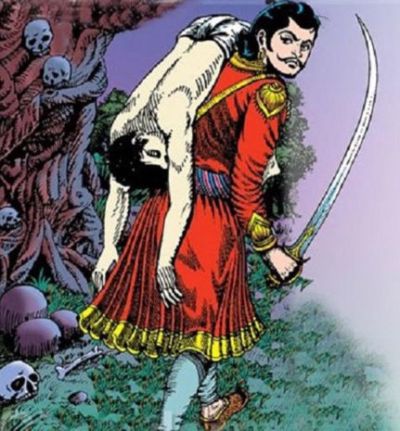The boy was special. Even at this tender age, he always took pleasure in being of assistance to his fellow human beings, as this was a trait that he carried forward from his previous lives.
In fact, he seemed to personify the merits of all the king’s subjects.
And so he came forward, and told the men who were making these announcements…
“I will offer myself for this noble deed. But please, wait here so that I can go and inform my parents, take their permission, and then come back to you.”

इत्य् ऊचिवांस् तान् मुदितान् स बालो ऽनुमतश् च तैः ।
गत्वा गृहं जगाद स्वौ पितरौ रचिताञ्जलिः ॥ १२,२७.९९ ॥
ददामि सर्वसत्त्वार्थं देहम् एतं विनश्वरम् ।
तन् माम् अभ्यनुजानीतं हतां चापदम् आत्मनः ॥ १२,२७.१०० ॥
आत्मप्रतिकृतिं ह्य् एतां गृहीत्वा वितरामि वाम् ।
हेमरत्नमयीं राज्ञा दत्तां ग्रामशतान्विताम् ॥ १२,२७.१०१ ॥
एवं मे युष्मदानृण्यं परार्थश् चैव सिध्यति ।
युवां च ध्वस्तदारिद्र्यौ बहून् पुत्रान् अवाप्स्यथः ॥ १२,२७.१०२ ॥
The announcers were delighted that they had found someone for the task, and said that they would wait for him at that very spot.
The boy went home, and folding his hands, said to his parents…
“Mother, father! I wish to offer this perishable body for the good of the community and my own family, and so please give me your permission.”
“If I do so, the king has promised to give me a statue made of gold, as big as me, complete with gems and diamonds…not only that, he will also give us one hundred villages!”
“I will receive these gifts, and hand them over to you. I will then leave with the king’s men.”
“In this way, I will repay my debt to you, and the community at large, and will attain moksha. You both will never be poor again and will be able to lead a very comfortable life. You will also be able to have many sons, who can replace me…”
इत्य् उक्तवन्तं सहसा पितरौ तौ तम् ऊचतुः ।
किम् एतद् भाषसे पुत्र वातेन क्षुभितो ऽसि किम् ॥ १२,२७.१०३ ॥
किं वा ग्रहगृहीतो ऽसि प्रलपस्य् अन्यथा कथम् ।
को ह्य् अर्थैर् घातयेत् पुत्रं देहं दद्याच् च कः शिशुः ॥ १२,२७.१०४ ॥
“What are you saying?”, cried out his parents in astonishment.
“Are you feeling ill? Or has some planetary influence corrupted you? If not, then what can make you speak this way?”
“What kind of parents would willingly cause the death of their child for the sake of wealth?”
“And what kind of child would sacrifice his own body?”
एतत् पित्रोर् वचः श्रुत्वा बालः पुन उवाच सः ।
न बुद्धिमोहाज् जल्पामि शृणुतं मे ऽर्थवद् वचः ॥ १२,२७.१०५ ॥
अवाच्याशुचिसंपूर्णम् उत्पत्त्यैव सुगुप्सितम् ।
दुःखक्षेत्रं विनाश्य् एव शरीरम् अचिराद् इदम् ॥ १२,२७.१०६ ॥
तद् एतेनात्यसारेण सुकृतं यद् उपार्ज्यते ।
तद् एव सारं संसारे कृतबुद्धिभिर् उच्यते ॥ १२,२७.१०७ ॥
सर्वभूतोपकाराच् च किम् अन्यत् सुकृतं परम् ।
तत्रापि पित्रोर् भक्तिश् चेत् किं देहाद् दृश्यते फलम् ॥ १२,२७.१०८ ॥
The boy smiled and replied…
“I am not deluded in any manner, in fact, I am making a lot of sense.”
“This body is impure, and gathers dirt from the day it is born. It is the abode of all pain, and will perish anyway, one day or the next.”
“The wise say that the only permanence in this creation is merit, and merit is acquired by this very body.”
“And what greater merit can there be in this world, other than serving all of creation? If I cannot show devotion to even my own parents, then of what use is this body of mine?”
to be continued…
